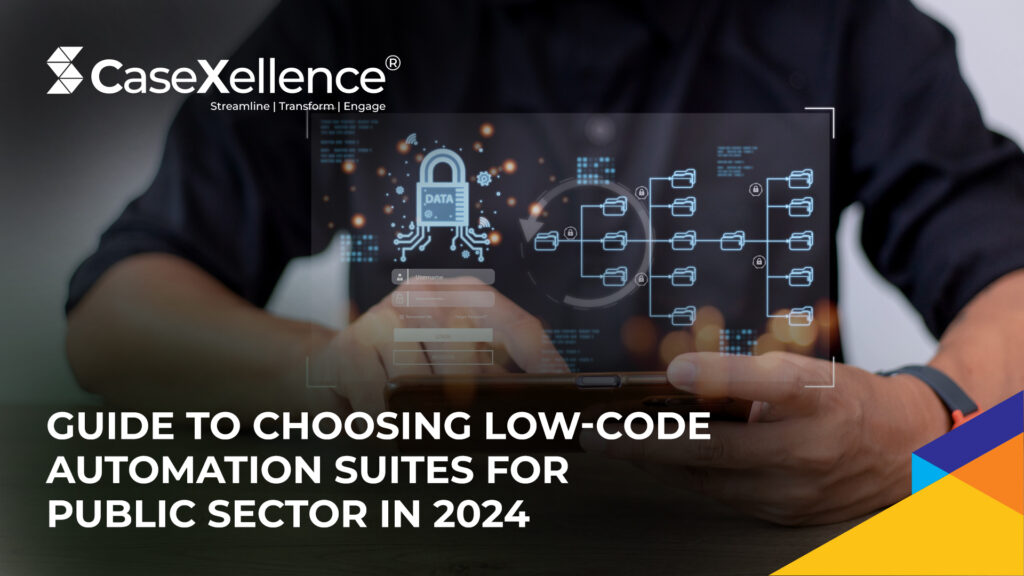In 2024, public sector organizations are under more pressure than ever to modernize operations while maintaining transparency, compliance, and efficiency. With the complexity of government processes and the necessity for rapid digital transformation, traditional software solutions often fall short. Enter the Low-code Business Process Automation Suite—a game-changing approach that allows public sector agencies to develop and deploy solutions faster, with less coding, while maintaining flexibility and scalability.
But with so many options available, how do you choose the right low-code platform tailored specifically for government operations? This guide provides key factors to consider when selecting a Low-code Business Process Automation Suite for public sector use.
Table of Contents
1. Understand the Unique Needs of Public Sector Organizations
Public sector organizations deal with diverse and complex challenges, including regulatory compliance, data security, and citizen services. Unlike private enterprises, these agencies require solutions that can seamlessly integrate with existing government case management software while ensuring compliance with evolving regulations. When evaluating a low-code suite, look for a case management platform that is purpose-built for government operations. It should offer customizable modules that align with various public sector workflows, whether it’s processing permits, managing grant applications, or handling public safety.
2. Emphasize Integration Capabilities
Government agencies rely on multiple legacy systems and databases to manage operations. Therefore, the ideal Low-code Business Process Automation Suite for public sector should offer robust integration capabilities with these existing systems. It should facilitate seamless data sharing across platforms like case management software for government, financial management systems, and human resource tools, ensuring a unified digital ecosystem. Additionally, integration with AI and machine learning tools is a plus, helping agencies leverage automation for improved decision-making and process optimization. Whether your agency is implementing a case management software solution for public safety or a platform for citizen engagement, integration is key.
3. Prioritize User-Centric Design and Usability
In the public sector, end-users range from tech-savvy developers to non-technical staff. Your chosen case management platform should provide an intuitive, drag-and-drop interface that empowers all users to build and manage workflows without extensive coding knowledge. Look for platforms that offer pre-built templates, guided workflows, and visual modeling tools. This approach ensures that even staff with minimal IT skills can automate routine tasks, from document management to service requests, with ease.
4. Focus on Scalability and Customization
The requirements of public sector organizations are constantly evolving, and the chosen government case management solutions should be scalable and customizable. Customization options should include everything from process workflows to user roles, ensuring that the solution evolves alongside your agency’s needs.
5. Ensure Compliance and Security Standards
Public sector organizations handle sensitive citizen data, making compliance and security non-negotiable. The right Low-code Business Process Automation Suite should be built with government standards in mind, supporting data encryption, role-based access, and audit trails. Ensure that the platform is compliant with key regulations, such as HIPAA, GDPR, and FedRAMP, to avoid risks associated with data breaches and non-compliance penalties.
6. Evaluate Vendor Experience and Support
Finally, select a provider with experience in delivering government case management solutions and who understands the unique challenges of public sector operations. Vendor support should be readily available to help your agency navigate complexities, from implementation to ongoing optimization.
Choosing the right Low-code Business Process Automation Suite for public sector organizations is pivotal in driving efficiency, agility, and transparency. Prioritize solutions that align with your agency’s needs, offer seamless integration, are scalable, and ensure compliance with stringent government regulations. By selecting the right platform, public sector agencies can streamline operations, enhance citizen services, and foster a culture of continuous improvement in 2024 and beyond.
Incorporating a case management platform like CaseXellence to streamline operations, transform public sector efficiencies, and engage citizens more effectively will enhance your government organizations digital transformation strategy.
As a leading Low-code Business Process Automation Suite, CaseXellence offers tailored solutions that are specifically designed to meet the intricate needs of government agencies. Its robust integration capabilities ensure seamless interaction with existing government platforms, enhancing workflow automation and decision-making processes with cutting-edge AI technologies.
Related Blogs about the Leading Low-Code Platform – CaseXellence
- What are the Advantages of Using Volunteer Management Software Over Traditional or Manual Methods?
- How Knowledge Management Solutions Enhance Transparency and Access to Information in the Justice System
- What is Justice and Public Safety Software and How Does It Improve Court Case Management with Its Advanced Intelligent Scheduling Feature?
- 5 Reasons State and Local Governments Should Adopt a Case Management Platform for Homeowner Relief Program
